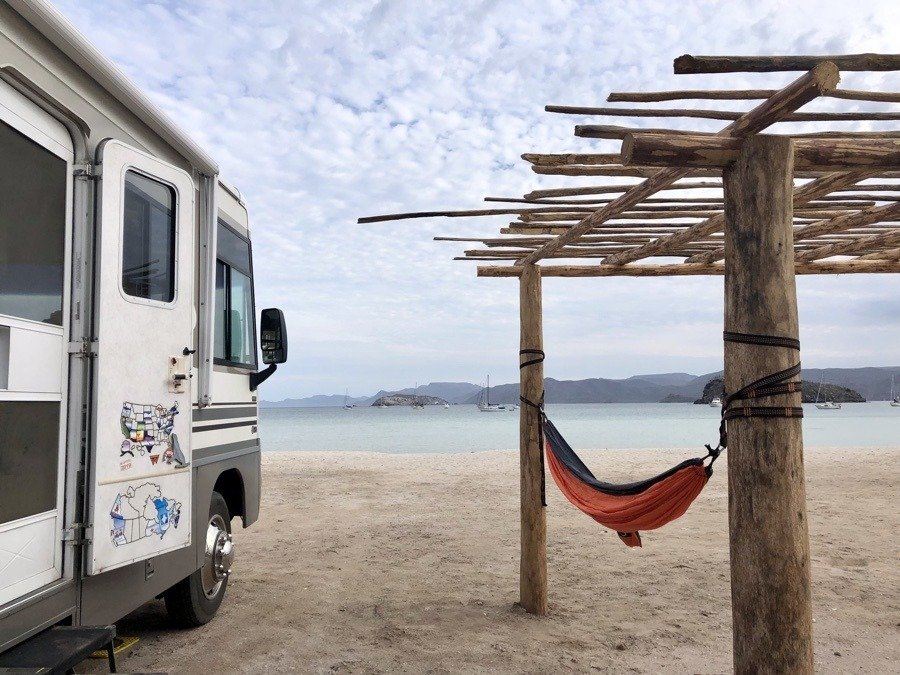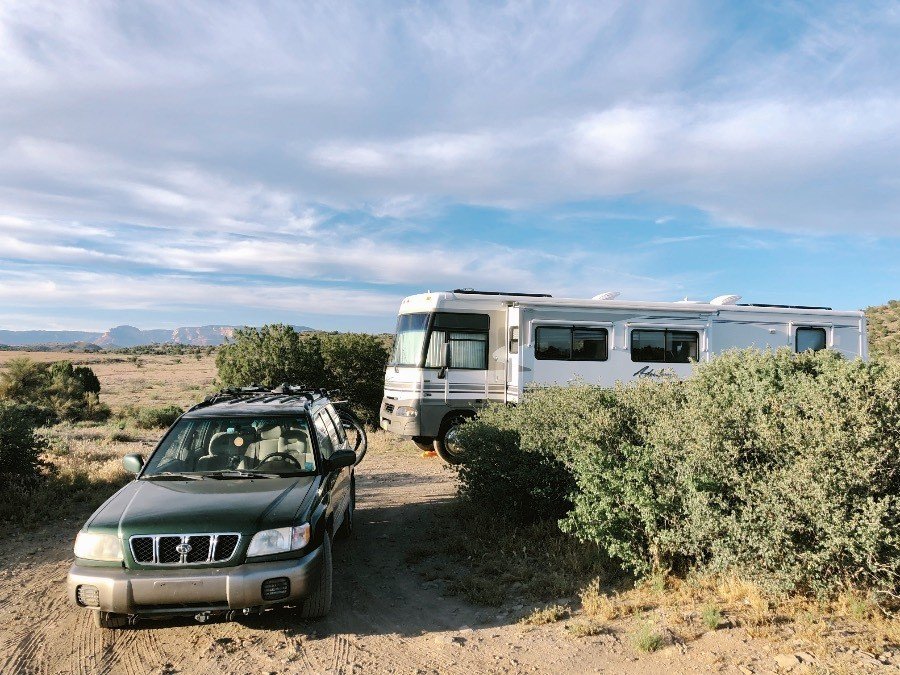RV Boondocking and Dry Camping
Are you curious about RV boondocking but don't know where to start? This is the post for you! Consider it a kind of "boondocking for beginners."
Before we decided to write this, we used it as a topic for discussion on a YouTube live broadcast during the middle of the COVID-19 mess. With many campgrounds closed, full-time RVers that aren't prepared to dry camp or boondock might find themselves in a pickle.
But don't worry - you don't have to watch all of that! We've written out all of the important points from the video below. If you have any questions, don't hesitate to drop us a comment!
What qualifies us to talk about RV boondocking?
Our first year out, we did very little dry camping because we were on the east coast. But once we moved out west, installed solar and a composting toilet, we started boondocking in our class a motorhome more and more.
Our trip to Alaska was the first time we really got to test the limits of our set-up. And we spent 80+ days off the hook that summer.
And the summer of 2019, we spent about 90 days boondocking on public lands in Colorado.

Choosing an RV for boondocking
We did not specifically pick our RV for boondocking so we were really lucky that it happens to have many features that made it a great choice for dry camping. We talk about the specific features of our 2003 Winnebago Adventurer 35u in this video, but here are some things to look for:
- Generator - You don't NEED solar. A generator will get the job done!
- Fresh, grey, black tank capacity - How long you can stay out before dumping and filling will depend on your tank capacities.
- Fridge with a propane option - If we don't need our propane for heat, it can run our fridge for 2 months or more.
- Propane/electric heater - If you're going to be in cooler temperatures, a built in propane heater that's safe to run at night will keep you cozy. Our RV has both propane and electric heaters.
- Propane/electric water heater - A propane water heater can also extend your dry camping. Our RV has a dual mode propane and electric water heater.
- Solar - Where can panels & components go? Do you have real estate on the roof for panels? Is there a good place for the inverter? How can you run the cables for those?
- Batteries - Where can you put additional batteries? You might lose a storage bin to these.
- Composting Toilet - Will a composting toilet fit? It does have a slightly larger footprint than a standard RV toilet because of the handle to turn the compost.
There has been a tendency for RV manufacturers to move towards all-electric rigs. Some people are afraid to have propane on board. It probably also simplifies the build for them. An all-electric coach is not a deal-breaker for boondocking, but you need to be aware of how much electricity you're going to be using. For example, do you have the battery capacity to run your fridge overnight without draining them?
When we were at the Tampa RV Show, we saw a new coach that ticked all of our boxes. It's the Newmar Baystar Sport 3014. We love the layout. There's plenty of room on the roof for solar. The storage is smart. It's just a wonderful set-up for full-timing and might be the best boondocking RV out there right now.
OUR SOLAR SET-UP
If you're curious about our RV solar set-up, we've put out a few videos showing your system.
What do YOU need for boondocking?
Everyone's needs for boondocking will be different. Are you retired or working? Do you have any essential medical equipment that needs constant electricity? How many hours of TV a day do you expect to be able to watch?
Some people might be perfectly comfortable running a generator for an hour or so each night to top up their batteries.
We both work and have our internet router and computers going all day long. We like to be able to get up in the morning and make a pot of coffee without being concerned about running out of power. With 1360 watts of solar panels on the roof and 600 amp hours of lithium batteries we have only had to run the generator a few times when we've had rain for multiple days in a row or poor sun exposure.
You can try to exactly calculate what you need or you can do what we did and overbuild your system.

Where can I find RV boondocking sites?
There are many resources out there for finding RV boondocking sites, but these are the ones we use the most.
Campendium
Our favorite tool for finding a campsite, boondocking or not, is Campendium. One of the most important features for us that it has is the cell signal strength by provider. We also know some of the reviewers personally and trust their advice. Campendium has a website and an iOS app.
Freecampsites.net
Freecampsites.net is another listing site that isn't as nice as Campendium but it has different reviews and is an older site. So if you aren't happy with the information on a particular campsite on Campendium, you might find the information you need there. Make sure to check the review date because some of them are really old.
Allstays
Allstays is both a website and an app (iOS only) for finding campgrounds, RV Parks, and services. It even shows things like propane, RV dumps, and grade warnings. Use the filters to see only the type of camping you want to do. For example, national parks, state parks, public lands, and independent parks all have different designations. The app is $9.99 but using the website is free.
iOverlander
When we traveled into Mexico, our usual sources for finding camping spots weren't all that helpful. It turns out iOverlander is much better when traveling through Mexico. It seems more #vanlife sorts of people use it so you'll find more information on free camping spots even in the U.S. iOverlander has free iPhone and Android apps or you can use it via the website.
MORE RESOURCES
Looking for more RV Resources? We've gathered all of our favorite resources gathered in one place. We cover camping, navigation, where to find food, finding fun things to do, and more!
Kitchen and cooking accessories for RV boondocking
Most RVs come equipped with the essentials for making and storing food. But here are a few extras that are nice to have.
Grill
So, funny story. We had a grill when we started our full-time journey. But it was kind of a bulky one and we eventually got rid of it. So we've been without a grill for about 2 years now. But we finally bit the bullet and got a new one - the Traeger Scout Pellet Grill! We've just started playing around with it so stay tuned to see how we like it.
Drinking Water
Plastic water bottles are an environmental nightmare. Please find another solution for your drinking water. If our RV hadn't already come with an inline water filter under our kitchen sink with a separate faucet for drinking water, we would have either installed one or gotten a Berkey.
Our under the sink filter is nice because it doesn't take up any counter space. And we all know that is at a premium in an RV. But the Travel Berkey is fairly small.
If you have plenty of fridge space, a filtering water pitcher will also do the trick.
Instant Pot
What? An electric appliance? At first glance, you might think that an Instant Pot would be too power hungry for boondocking. But once it gets to pressure, it only uses a bit of power to keep it at pressure for the cook time. And because it cooks faster than most other methods and doesn't heat up the house, we consider it a boondocking essential.
Dual fridge
Having a refrigerator that works off of both electricity and propane gives you great flexibility when boondocking. For example, if we're low on propane, we can switch our refrigerator to electricity during the day when our solar panels are bringing in energy. Or, if we've got plenty of propane, we'll leave it on that setting. If you have an electric only fridge, it will figure heavily into your power usage calculations.
We hope this post helped demystify RV boondocking for you. So what do you think - is RV boondocking for you?
If you have any questions, please drop them in a comment and we'll be happy to try to help!

[…] thoughts on this article. from a vandweller’s point of view. Some of my objections are technical, some are […]
[…] you’re just getting into RV boondocking, you could even look into LED awning lights or motion sensors, to help you find your camper when […]